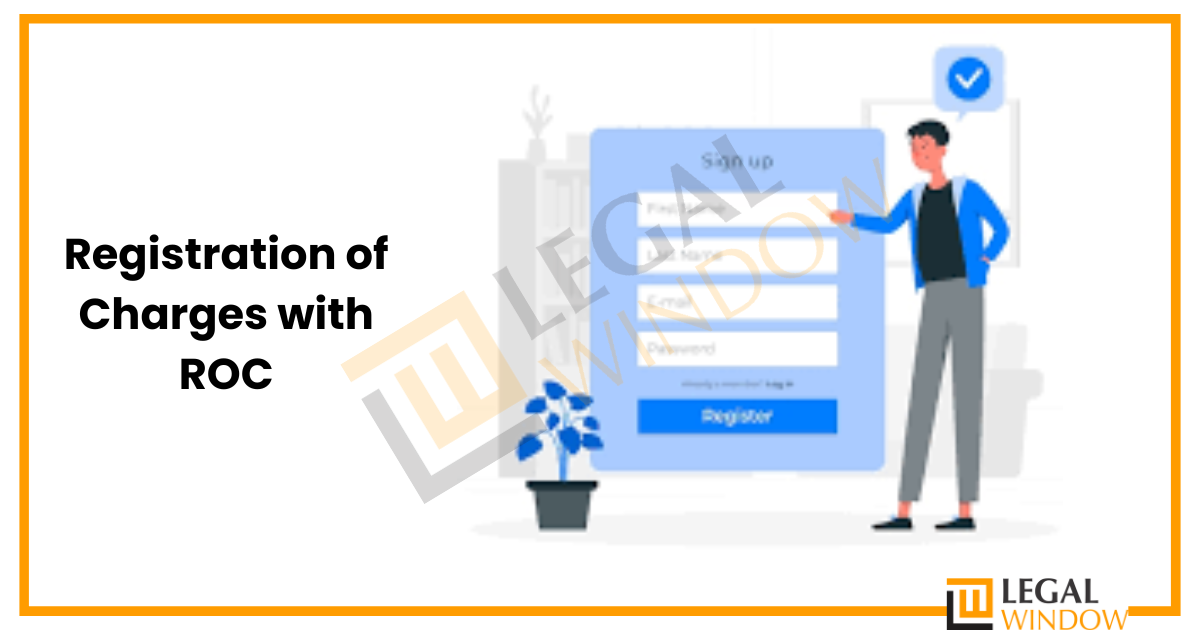Examine the business regulations can be daunting, generally for those, who are new in the corporate world. As per the countless legal responsibilities, which entities must accomplish the registration of charges with Registrar of Companies (ROC) stands out for a significant yet often misunderstood procedure? In this article, we provide the process of registration of charges with ROC.

| Table of Content |
Brief about Charge
The Companies Act, 2013 provides the provisions or we can say define the charge under section 2(16). It means an interest or lien made on the assets or property of an organization or any of its undertakings or both as security and also involves a mortgage. The Company’s charge is a right made by a company who is known as “the borrower” on their properties and assets, which may be present and future. It is in favor of a financial association or bank, which will be called “the lender”. Most enterprises borrow money to fulfill their short-term and long-term capital needs from financial institutions and banks.
To lend money, banks have made various legal documents such as loan agreements, mortgage deeds, etc. to mention the terms and conditions of the loan and make sure to repay with interest as per terms.
Requirement of Charge Creation
Here are certain sections and rules which are applicable for the registration of charges with RoC Companies Act, 2013 provisions are from sections 77 to 87.
Requirement of charge creation: It is a kind of security made on secure company lent. A charge may be fixed in case of a particular item attached to it such as a floating charge, if the charge is formed over changing assets for instance, receivable, cash; or property like land. The charge forms by the company on their assets and it is an obligation to companies to charge registration with RoC of the specific creation of charge. The objective of charge registration with RoC is to offer public notice for those who contemplate giving credit to the company on how far the company’s property is hindered.
In the current situation, no. of non-performing assets is rising because financial institutions are not lending money unless they feel secure about the lending amount and the amount is in safe hands. For security purposes, the financial institutions have taken over the right to the company’s assets. Generally, a charge is formed on the instruments such as loan agreements, deeds of mortgage, or any other legal documents.
Who can apply for registration of charge with RoC?
The charge is created by the company as it's their duty. If the company fails to register the charge within 30 days as per section 77(1) of the Companies Act, 2013, without prejudice to its liability about any offense under this chapter. An individual in whose favor the charge is made may apply for the registration of charges with RoC along with the instrument made for the charge. An individual is entitled to recover from the company the amount of fees. However, before filing a form, an individual will give 14 days’ notice to the Company. In case the Company is not going to register a charge or show potential cause then the individual himself will file a form with the RoC
Registration of Charge with RoC
When a charge is created, it becomes the duty of the company to the registration of charges with RoC and also files the necessary documents, which make a charge over the company. According to the Companies Act, 2013, some of the charges created by a company should be registered:
- Creation of charge is for the objective of securing any issue of debentures or deposits;
- It is on the Company’s uncalled share capital;
- Charge is on immovable property, wherever it is, or any interest therein;
- Creation of charge on any company’s book debt;
- It is on any of the Company’s movable property it includes stock-in-trade;
- Creation of charge on calls but not paid;
- Charge is on any share in a ship or a ship;
- Creation of charges is on intangible assets, such as patent, goodwill, license under a trademark, patent, and copyright.
- Charges registration of a motor vehicle is not compulsory unless needed by the lender. In addition to the non-registration of charges with RoC, a disclosure should be made in the Company’s balance sheet.
There is a limited period for registration of charge with RoC, which is 30 days from its creation. Registration of charge with RoC of filing can be created up to 300 days from the date of the charge created. It is given an appropriate explanation and the applicable fee is paid for late filing for the charge registration with RoC.
In case an application is made for charge registration to the RoC in the given format and the government is satisfied with the application, then a certification of charge will be issued by the RoC. The creation of charges on the Company’s assets, which can also be seen online on the portal of MCA.
Provision of Charge as mentioned in Companies Act, 2013
Forms required for Charge management
Here is a list of forms required for e-filing under charge management:
| S. No. | E-FORMS | OBJECTIVE |
|
|
CHG-1 | Modification or creating the charge (except Debentures) |
|
|
CHG-2 | Registration Certificate |
|
|
CHG-3 | Certificate of charge modification |
|
|
CHG-4 | Intimation of the Registrar's satisfaction with the application. |
|
|
CHG-5 | Memorandum of charge satisfaction |
|
|
CHG-6 | Notice of appointment or cessation of receiver or manager |
|
|
CHG-7 | Register of Charges |
|
|
CHG-8 | Application for condonation of delay shall be filed with the Central Government |
|
|
CHG-9 | Creating or modifying the charge in (for debentures including rectification) |
|
|
CHG-10 | Application for delay to the Registrar |
All the fees shall be done as per the Companies (Registration offices and fees) Rules, 2014, which are issued by the MCA.
End thoughts
Here we can conclude that the registration of charges with RoC is a vital procedure, which makes sure about legal compliance, credibility, and transparency within the corporate world. Through charge registration with RoC, companies offer valuable details to shareholders about the Company’s financial assets and obligations, which give confidence and trust in the business environment. If you have any doubts regarding the current topic, then feel free to connect with the Legal Window Team.
CS Urvashi Jain is an associate member of the Institute of Company Secretaries of India. Her expertise, inter-alia, is in regulatory approvals, licenses, registrations for any organization set up in India. She posse’s good exposure to compliance management system, legal due diligence, drafting and vetting of various legal agreements. She has good command in drafting manuals, blogs, guides, interpretations and providing opinions on the different core areas of companies act, intellectual properties and taxation.
Categories
- Agreement Drafting (23)
- Annual Compliance (13)
- Change in Business (37)
- Company Law (150)
- Compliance (90)
- Digital Banking (3)
- Drug License (4)
- FEMA (17)
- Finance Company (42)
- Foreign Taxation (9)
- FSSAI License/Registration (15)
- GST (124)
- Hallmark Registration (1)
- Income Tax (214)
- Latest News (36)
- Miscellaneous (170)
- NBFC Registration (8)
- NGO (18)
- SEBI Registration (6)
- Section 8 Company (10)
- Start and manage a business (27)
- Startup/ Registration (134)
- Trademark Registration/IPR (48)
Recent Posts
- Major Upgrade: Breaking Down GST 2.0 September 15, 2025
- New Income Tax Bill 2025 August 27, 2025
- ITR-3 Form Explained: Who Should File & Step-by-Step E-Filing Guide (FY 2024-25) June 25, 2025
All Website Tags
About us
LegalWindow.in is a professional technology driven platform of multidisciplined experts like CA/CS/Lawyers spanning with an aim to provide concrete solution to individuals, start-ups and other business organisation by maximising their growth at an affordable cost.










